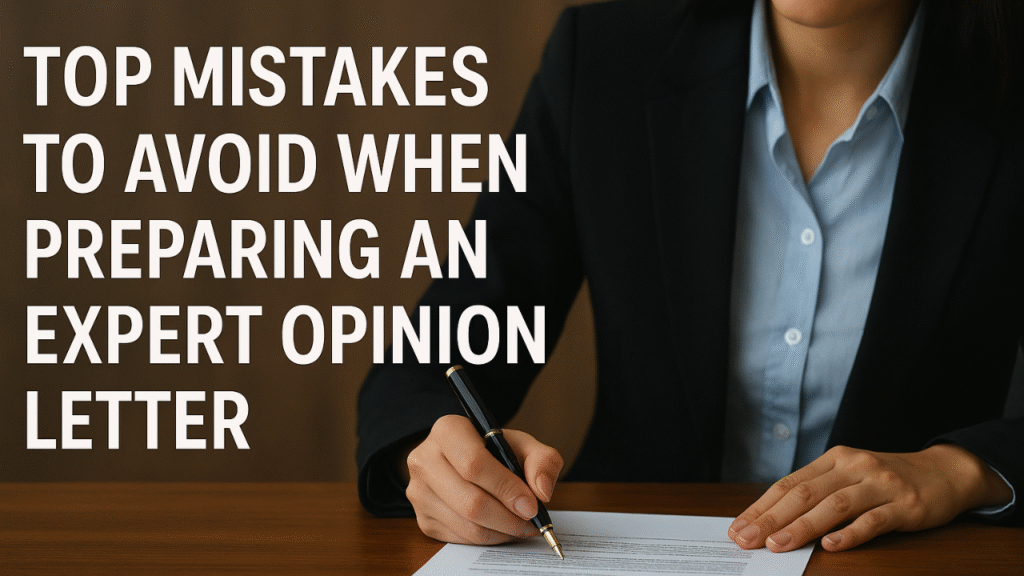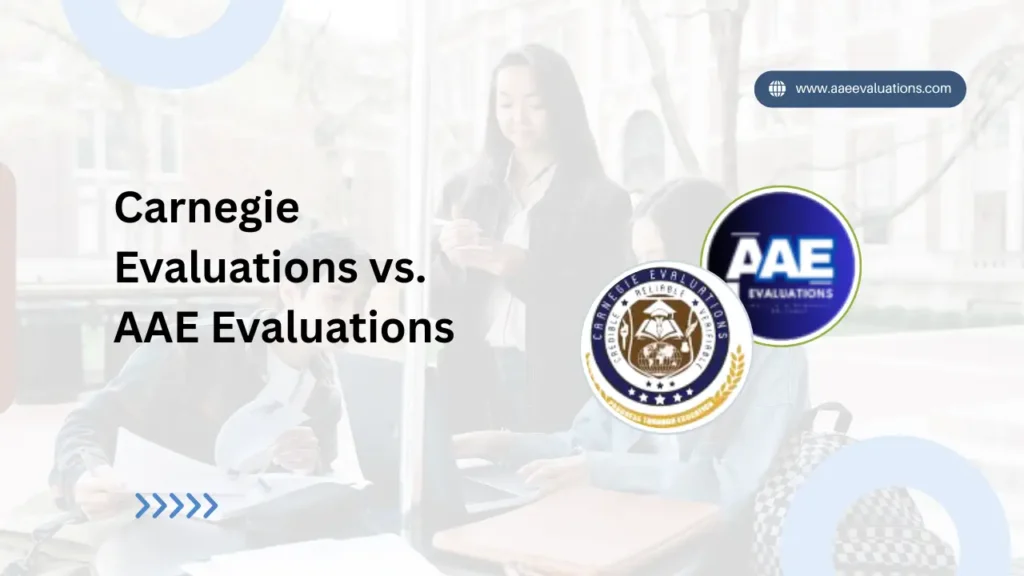10 Mistakes to Avoid in Your Expert Opinion Letter
Applying for an employment-based visa or professional evaluation can be both exciting and nerve-wracking. Whether you are pursuing the EB1A visa, the EB2 NIW, or any other U.S. immigration category, one crucial document can make or break your case the Expert Opinion Letter.
This letter is much more than a formal requirement; it is a professional evaluation that helps immigration officers understand your expertise, achievements, and the significance of your contributions. Unfortunately, many applicants underestimate how important this letter really is, and even small mistakes in its preparation can lead to serious consequences such as processing delays or application denials.
In this blog, we will walk you through the most common mistakes people make when preparing an Expert Opinion Letter, and more importantly, how to avoid them. You will also find a practical table that summarizes each mistake with clear solutions. By the end, you will know exactly what to look out for and how to ensure your letter makes a strong, lasting impression.
What Exactly Is an Expert Opinion Letter?
An Expert Opinion Letter is a detailed statement written by a qualified professional who is recognized in their field. The purpose of this letter is to analyze and validate your educational background, professional experience, and overall qualifications. It translates your expertise into clear, credible, and understandable terms for immigration officers or credential evaluators who might not share your technical background.
For example, in an EB1A Expert Opinion Letter, the evaluator explains how your achievements meet the criteria of extraordinary ability. They may highlight your leadership roles, published research, patents, or industry impact to show that you are at the top of your field.
This letter essentially bridges the gap between your accomplishments and the official standards required for visa approval. It provides clarity, context, and professional validation in a format that USCIS officers can easily assess.
Why Getting It Right Matters
The U.S. immigration process is document-driven. Every claim you make must be backed up with clear evidence and professional evaluation. If your Expert Opinion Letter is vague, poorly structured, or prepared by someone unqualified, it can create confusion rather than clarity.
Remember, the reviewing officer may not have any background in your field. Their understanding of your qualifications largely depends on how well your letter explains them. If it is written with unclear language or lacks proper evidence, the officer might not grasp the full extent of your expertise.
That is why professional preparation is essential. Companies like AAE Evaluations specialize in ensuring that each Expert Opinion Letter is clear, compliant, and crafted by credible experts who understand both your field and USCIS expectations.
Common Mistakes to Avoid (and How to Fix Them)
Here is a professional breakdown of the most frequent errors people make when preparing an Expert Opinion Letter, along with practical tips to avoid them.
| Common Mistake | How to Avoid It |
| 1. Choosing the Wrong Expert | Select an expert with proven credentials and experience in your field. They should have recognized authority such as a Ph.D., industry leadership, or extensive research experience. |
| 2. Using Vague or General Statements | Replace generic claims with measurable achievements. Use facts, data, and examples to demonstrate your expertise clearly. |
| 3. Ignoring USCIS Requirements | Understand your specific visa criteria (EB1A, EB2 NIW, O1, etc.). Each requires different types of evidence and achievements. |
| 4. Missing Supporting Evidence | Always include documentation that supports your claims such as publications, awards, patents, or leadership roles. |
| 5. Overly Technical Writing | Simplify complex terminology so non-specialists can understand your work. Focus on impact, not jargon. |
| 6. Inconsistent or Missing Details | Double-check all dates, positions, and facts for accuracy. Ensure they align with your resume and petition documents. |
| 7. Poor Formatting and Structure | Use a professional layout with sections, headings, and clear organization. This improves readability and presentation. |
| 8. Not Tailoring the Letter to the Visa Type | Each visa has distinct eligibility criteria. Customize your letter’s focus to match those standards. |
| 9. Weak Conclusion or Summary | End with a confident statement that reinforces your eligibility based on the evidence provided. |
| 10. Skipping Final Proofreading | Review carefully for grammar, structure, and consistency before submission. Even small errors can affect credibility. |
1. Choosing the Wrong Expert
Your Expert Opinion Letter is only as strong as the expert who writes it. The USCIS gives significant weight to the evaluator’s qualifications. If your letter comes from someone with limited authority or unrelated experience, it can weaken your application.
To ensure credibility, your chosen expert should:
- Have a strong academic or professional background in your field.
- Possess recognized achievements such as research publications or leadership positions.
- Be able to evaluate your credentials objectively and factually.
Organizations like AAE Evaluations are known for connecting applicants with qualified experts who have relevant domain expertise, ensuring your letter holds professional weight.
2. Using Vague or Generic Statements
One of the most common reasons an Expert Opinion Letter fails is the use of vague or repetitive language. Statements like “He is an excellent professional” or “She is a great contributor to her field” sound flattering but carry little substance.
Instead, focus on specific, measurable examples such as:
- “Developed an innovative data analysis model that increased accuracy by 45%.”
- “Authored three peer-reviewed research papers published in top international journals.”
- “Led a cross-functional team that delivered a $2M project ahead of schedule.”
These examples not only demonstrate expertise but also show tangible results, which USCIS officers value more than adjectives.
3. Ignoring USCIS Requirements
Different visa categories have different benchmarks. For example, an EB1A Expert Opinion Letter must establish extraordinary ability, while an EB2 NIW focuses on how your work benefits the national interest.
Before drafting, review the official USCIS criteria. For EB1A, the expert should highlight evidence such as:
- Major international awards or recognition.
- Membership in associations that require outstanding achievements.
- Published material about your work.
- Original contributions of major significance.
- High salary or remuneration compared to peers.
A well-prepared expert ensures that your letter aligns perfectly with these benchmarks, leaving no ambiguity for immigration officers.
4. Missing or Weak Supporting Documentation
Even the strongest opinion means little without evidence. The expert’s statements must be supported by verifiable documentation. Always include:
- Copies of your degrees and certifications.
- Evidence of employment and leadership roles.
- Publications, media mentions, or patents.
- Recommendation letters from other professionals.
Supporting evidence validates the expert’s claims and proves that your accomplishments are authentic and verifiable.
5. Overly Technical or Complex Writing
Remember, the person reviewing your Expert Opinion Letter may not understand technical jargon or industry-specific terms. A letter filled with complex language can confuse rather than convince.
Focus on clarity. The goal is not to impress the officer with technical detail but to make your expertise understandable. For example:
Incorrect: “The applicant’s algorithm implements stochastic gradient descent optimization for hyperparameter tuning.”
Correct: “The applicant developed a machine learning algorithm that improved data accuracy by 30%.”
Simple language ensures your contributions are easy to grasp and appreciate.
6. Inconsistent or Missing Details
One of the quickest ways to lose credibility is through inconsistent information. If your Expert Opinion Letter lists dates, job titles, or achievements that do not match your resume or petition, it can raise doubts.
Before submission, double-check:
- Dates of employment and education.
- Job titles and organization names.
- References and publication details.
Consistency signals professionalism and attention to detail, both crucial for approval.
7. Poor Formatting and Structure
Even if your content is excellent, poor formatting can make your letter look unprofessional. An ideal structure includes:
- Introduction: Expert’s credentials and relationship to the applicant.
- Purpose: The reason for writing the letter (for example, supporting an EB1A petition).
- Evaluation: Detailed analysis of qualifications, experience, and achievements.
- Conclusion: Clear statement affirming that the applicant meets the visa requirements.
Make use of bullet points, headings, and spacing for readability. Avoid long, dense paragraphs as they make it harder for officers to process information.
8. Not Customizing for the Visa Type
A one-size-fits-all letter rarely works. Each visa type has its own focus and eligibility standards.
For example:
- An EB1A Expert Opinion Letter should highlight extraordinary achievements, national or international recognition, and leadership.
- An O1 letter focuses on distinction and contributions to your industry.
- An H1B letter emphasizes the specialized nature of your job and the relevance of your degree.
Tailoring your letter shows that it has been carefully prepared for your specific case, not copied from a template.
9. Weak or Unclear Conclusion
A strong conclusion reinforces the expert’s authority and your eligibility. Avoid generic phrases like “I believe the applicant is suitable for this visa.” Instead, the expert should state their opinion confidently and clearly, such as:
“Based on my evaluation of the applicant’s professional achievements, research contributions, and leadership roles, I conclude that they meet the standards of extraordinary ability required for the EB1A category.”
This kind of statement leaves no room for doubt and demonstrates professional conviction.
10. Skipping Proofreading and Quality Checks
Minor spelling, grammar, or formatting mistakes might seem harmless, but they can undermine your document’s credibility. Always take time to proofread the letter or have it reviewed by an experienced evaluator.
AAE Evaluations follows a rigorous quality-control process to ensure that each letter is error-free, consistent, and professionally formatted before it is finalized. That extra step can make a big difference in how your application is received.
Additional Tips for Success
Here are a few bonus pointers to make your Expert Opinion Letter stand out:
- Be concise but detailed. Avoid unnecessary filler; every sentence should add value.
- Stay factual and objective. The expert’s tone should be analytical, not promotional.
- Include the expert’s full credentials. Their position, academic background, and contact information should appear on the letterhead.
- Keep formatting consistent. Use uniform fonts and margins throughout.
- Ensure timely updates. If your achievements have changed, include the latest information before submission.
Why Professional Help Makes a Difference
Preparing an Expert Opinion Letter requires more than just writing skills. It demands a deep understanding of immigration standards, evaluation criteria, and professional ethics.
AAE Evaluations specializes in connecting applicants with credible experts who can accurately assess qualifications, provide evidence-based opinions, and ensure full compliance with USCIS standards. Their experience helps applicants avoid common pitfalls while saving valuable time during the process.
Final Thoughts
Your Expert Opinion Letter is not just another formality. It is a powerful tool that tells your professional story in a clear, credible, and compelling way. Avoiding common mistakes such as vague wording, weak evidence, or poor formatting can dramatically improve your chances of success.
With careful attention to detail and guidance from experienced professionals like AAE Evaluations, you can ensure your letter reflects your achievements with accuracy and confidence.
An expertly prepared EB1A Expert Opinion Letter can be the key that unlocks new opportunities, so take your time, get it right, and let your expertise shine through.



